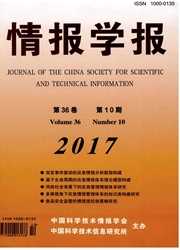

 中文摘要:
中文摘要:
零被引和低被引是与高被引相对称的现象,在科技文献中很常见。近年来人们开始关注零被引文献的潜在价值,关注“睡美人”的唤醒,关注低被引作为引用分布的“尾部”可能发挥的作用。零被引问题的研究历程主要可以分为探讨阶段和建模定量阶段两个重要阶段。目前的研究在内容上包括了零被引论文比例、首次被引等角度,在方法上从常规的统计分析到数学建模不一而足,还将零被引与期刊评价、科技评价联系了起来。但相关研究尤其我国的研究仍然较少,并且存在着零被引定义不清、自引难处理、数学模型亟待完善等问题。
 英文摘要:
英文摘要:
It is very common in scientific literatures that zero cited and low cited phenomena are symmetrical to high cited phe nomenon. In recent years, people begin to pay attention to the potential value of zero cited literatures, and show concern about the awakening of "sleeping beauties", and the role that the low cited literatures may play as the tail of the citation distribution. The re search course of zero cited problem may be divided into 2 important stages, that is, exploration stage and modeling stage. The cur rent research includes in content the ratio of zero cited theses and the first citation. In methodology, it ranges from routine statistical analysis to mathematical modeling. It also relates zero cited phenomenon with journal evaluation and scientific evaluation. However, there is still a little relevant research in this field, especially in China. And there exist the problems such as unclear zero cited defi nition, difficult to deal with selfcitation, and urgent to perfect the mathematical model.
 同期刊论文项目
同期刊论文项目
 同项目期刊论文
同项目期刊论文
 期刊信息
期刊信息
